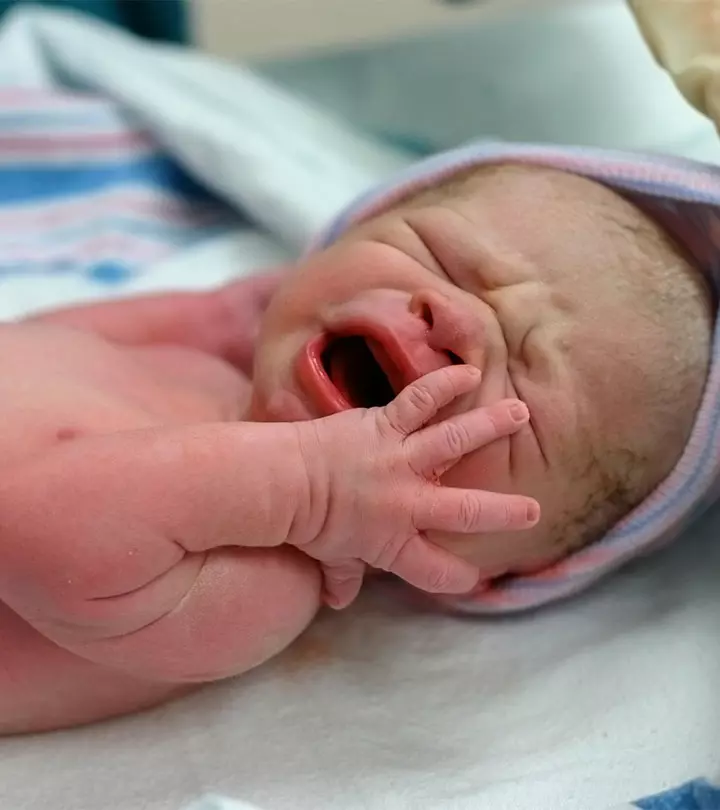
Image: Shutterstock
One thing that is common to all those in the family way is the excitement to know the gender of their baby. “Is it a boy or a girl?”— this is a common question most parents are likely to ask the doctor during their ultrasound examinations, sometimes even before the 20-week ultrasound (1). Plus, there are quite a few fun gender tests and old wives’ tales that claim to guess the gender of the baby even before birth. But honestly, they are far from accurate.
We’ve all heard that our parents’ genes primarily determine our appearance, but it could come as a surprise to many that the gender of the baby, too, is dependent on the father’s family! Intrigued? Yes, science has confirmed that the genes your father inherited from his family could indicate the likelihood of him fathering a baby boy or a girl (2). Here’s what a recent study tells us to confirm this fact:
Are You More Likely To Have A Boy Or A Girl?

Image: Shutterstock
If you’re an expecting parent, it’s a given that you are anxious, thrilled, and delighted. Nine months of pregnancy is a long journey, and, understandably, the wait seems to be never-ending!
Doctors commonly suggest that it’s a fifty percent chance that a woman will give birth to a boy or a girl. However, that isn’t entirely true. There is a little bias toward male births. According to WHO statistics, about 51 percent of deliveries will result in the birth of a male child (3). Though the number may be distorted (given the bias toward the birth of a male child), there is another explanation for it.
Research conducted by Newcastle University has shown that this higher number of the male population could be nature’s way of balancing the higher death rate in males due to accidents, wars, or their exposure to risky activities that result in life-threatening injuries. While shifts in childbirths can be random, medical evidence suggests otherwise. Perhaps, genetic factors can explain the changes in the number of boys and girls at specific periods in history (2).
It’s All About The Father’s Genes

Image: IStock
Research shows that a man’s genes determine if he will have more sons or daughters. Men inherit the tendency to have more males or female children from their parents. This implies that a man with many brothers is more likely to have a boy child while a man with more sisters will be dispositioned to have a girl child (2).
The sperm of a man carries X chromosomes and Y chromosomes. The man’s X chromosomes and a woman’s X combine to form a girl (XX), while a man’s Y chromosome combines with a woman’s X to form a boy (XY). However, if the sperm doesn’t have equal X and Y chromosomes and if other genetic factors have influenced the gender of the child, it can affect the chances of having a baby boy or a girl (2).
In this study of 927 family trees across England and North America (dated back to 1600) that had at least three generations and included over half a million individuals, they found that the ratio of males to females in a family depends on the father’s side and not the mother’s side. This study suggested that this could be due to a gene that determines the balance of X and Y chromosomes carried by the sperm. Men who hold a specific gene that leads to the sperm carrying more Y chromosomes are likely to have more sons. Thus, the number of men with more X chromosomes than men who have more Y chromosomes affects the ratio of boys to girls born each year (2).
In countries that fought the World Wars, there was a sudden increase in the number of boys born after the war. When World War I ended, for every 100 girls, two extra boys were born in the UK compared to the year before the war began. This as-yet-undiscovered gene could explain why. As men with more sons saw the return of a son from war, these sons were likely to father boys because of the inherited gene from their fathers. On the other hand, men who had more daughters who had lost their only sons in the way, those sons would have been more likely to have daughters. This explains why men who survived the war had a higher potential to have boy children, resulting in the boy-baby boom (2).
Now that we have seen how predicting the gender of the baby depends on various factors, we must ask ourselves the question “Is it important to know the gender of the baby in advance?”. Unfortunately the answer is more complicated than we might think. It totally depends on the intention of the parents. Some parents might want to know the gender just out of curiosity or to have a better preparedness when it comes to choosing names or room decor. In most developed western countries that indeed is the case and there’s nothing wrong with that. However, in some poor and backward communities, unfortunately that includes India, the intentions can be much more malevolent. In some communities, a male child is preferred over a female one, and for that people try to determine the sex of the fetus in early stages. This is a sad truth which cant be ignored and something against which the government is fighting tooth and nail. In places where such practices might be happening, it’s better to not allow sex determination tests at all.
Discovering the gender of the baby is certainly exciting news for expecting parents. But indeed, this fact is fascinating! Consider drawing up the family tree and verifying it yourself. This could be a fun activity to engage in with your kith and kin. Does this fact also explain the birth of male or female children in your family? Let us know in the comments section below!
References
- 20-week screening scan
https://www.nhs.uk/pregnancy/your-pregnancy-care/20-week-scan/ - Boy or girl? It’s in the father’s genes
https://www.sciencedaily.com/releases/2008/12/081211121835.htm - You Should Be Worrying about the Woman Shortage
https://www.hrw.org/world-report/2019/country-chapters/global-0#
Community Experiences
Join the conversation and become a part of our nurturing community! Share your stories, experiences, and insights to connect with fellow parents.












